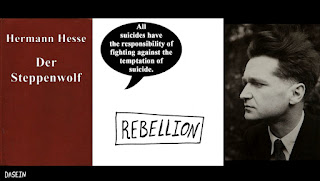This blog is assigned by Barad Sir as a part of Flipped Learning Activity. For more information on the task, click here. Before we begin the exploration of this topic, it is important to know the basics of Flipped Learning.
Flipped Learning -
Flipped Learning is a teaching method where traditional lectures are assigned as homework, freeing up class time for interactive, hands-on activities led by the educator. This approach encourages students to independently absorb content beforehand, allowing for more engaging and collaborative learning experiences during class sessions.
For more information on it, you can check out this blog - Flipped Learning
Existentialism thoughts from the videos -
I am impressed by these thoughts from Video 1:-
In the video, the subject matter of existentialism is explained in a wonderful manner. Existentialism is like a triangle and its three sides are freedom, passions and individuality.
I am also impressed by the idea that existentialism is popular in young people because it deals with the subject that the young people might be struggling with. This includes: suicide, anguish, absurdity, passions, emotions, death, freedom, or even despair. This statement shows the relevance of existentialism.
I am impressed by these thoughts from Video 2:-
Here, suicide as an art is the idea that impresses me very much. Suicide is a private act that is prepared within the silence of the heart and this makes it similar to a great work of art.
To further explain this point, a statement from the movie ‘Stay’, is provided -
“An elegant suicide is the ultimate work of art.”
It also reminds me of the death of Virginia Woolf, which can also be considered as artful suicide.
I am impressed by these thoughts from Video 3:-
For an absurd mind, reason is useless and there is nothing beyond reason.
Absurdist is not scared of the reality, because seeking what is true is not seeking what is desirable.
I am impressed by these thoughts from Video 4:-
Video 4, shows Nietzsche idea that impresses me very much. “ whom do they hate most? Him who breaks up the tables of values, the breaker, the law breaker. He, however, is the creator.”
I am impressed by these thoughts from Video 5:-
One should judge the values themselves and choose to follow the ones that they consider appropriate. However, one should also be responsible he makes independently.
I am impressed by these thoughts from Video 6:-
In video 6, the idea of nihilistic consent given by Emil Cioran is also interesting to study as it presents the opposite view from Albert Camus.
I am impressed by these thoughts from Video 8:-
In here, the existentialism theory is explaining to 5 year olds. This in itself is very impressive. Here the concept of Ubermensche or Superman is explained very well.
I am impressed by these thoughts from Video 9:-
In video 9, The Creator’s understanding of existentialism is discussed. Many brilliant ideas are presented by him. The ones that impressed me the most are -
We are not alive to understand things, but we understand things to be more fully alive.
Wisdom is knowing when it’s right to suffer, or let others suffer, and when it’s not.
Remember that you are human which in itself, is an extraordinary and brilliant destiny.
I am impressed by these thoughts from Video 10:-
Here, given definition of absurdity is very simple and easy to understand and hence impressive. Absurdity - the search for answers in an answerless world.
Video I liked the most:-
The video I like the most is “Why I like existentialism” by Eric Dodson. In here, he explains his own understanding of existentialism. You can check out the video here:-
He also provides 10 ways to live more like an existentialist. They are as follows:-
Learning Outcome:-
Through engaging with the flipped learning materials on existentialism, I have gained a solid understanding of existentialist philosophy, including its core principles and their significance in human life. I am now able to articulate the main ideas of existentialism, analyse how they apply to real-life situations, and reflect on their implications for my own beliefs and choices. This learning experience has allowed me to study at my own pace, accessing videos and reading materials at times that suit my schedule. As a result, I feel more empowered in my learning process, as I can take the time needed to grasp complex concepts fully.
Questions -
1. “A total absence of Hope not despair, a continual rejection not renunciation, and conscious dissatisfaction not immature unrest”. How can we differentiate between these three concept? (Video 3, 1:55)
2. In the explanation about Aristotle’s concept of “Essence”, there is a little bit of confusion. Aristotle suggests that human can act differently from their true essence, but cannot change it. But wouldn’t acting differently from one’s essence automatically mean changing it? (Video 7, 8:57)
3. The quote says that “If the world is going to have any of the things most of us value - like justice and order - we’re going to have to put it there ourselves”. But isn’t all the justice system already made by us? Or are they suggesting each individual input in justice system? (Video 10, 7:45)
4. “true knowledge is impossible and rationality and science cannot explain the world” why does Camus say that true knowing is impossible? (Reading Material, The Myth of Sisyphus, Chapter 1 summary)
5. To escape the absurdity of life, Albert Camus suggested three options. He is in favour of “Acceptance of the Absurd”. How is that different from philosophical suicide?
6. “Acceptance of the Absurd” is labelled a rebellion. But if it’s about accepting something, how can it be considered revolting?








Comments
Post a Comment